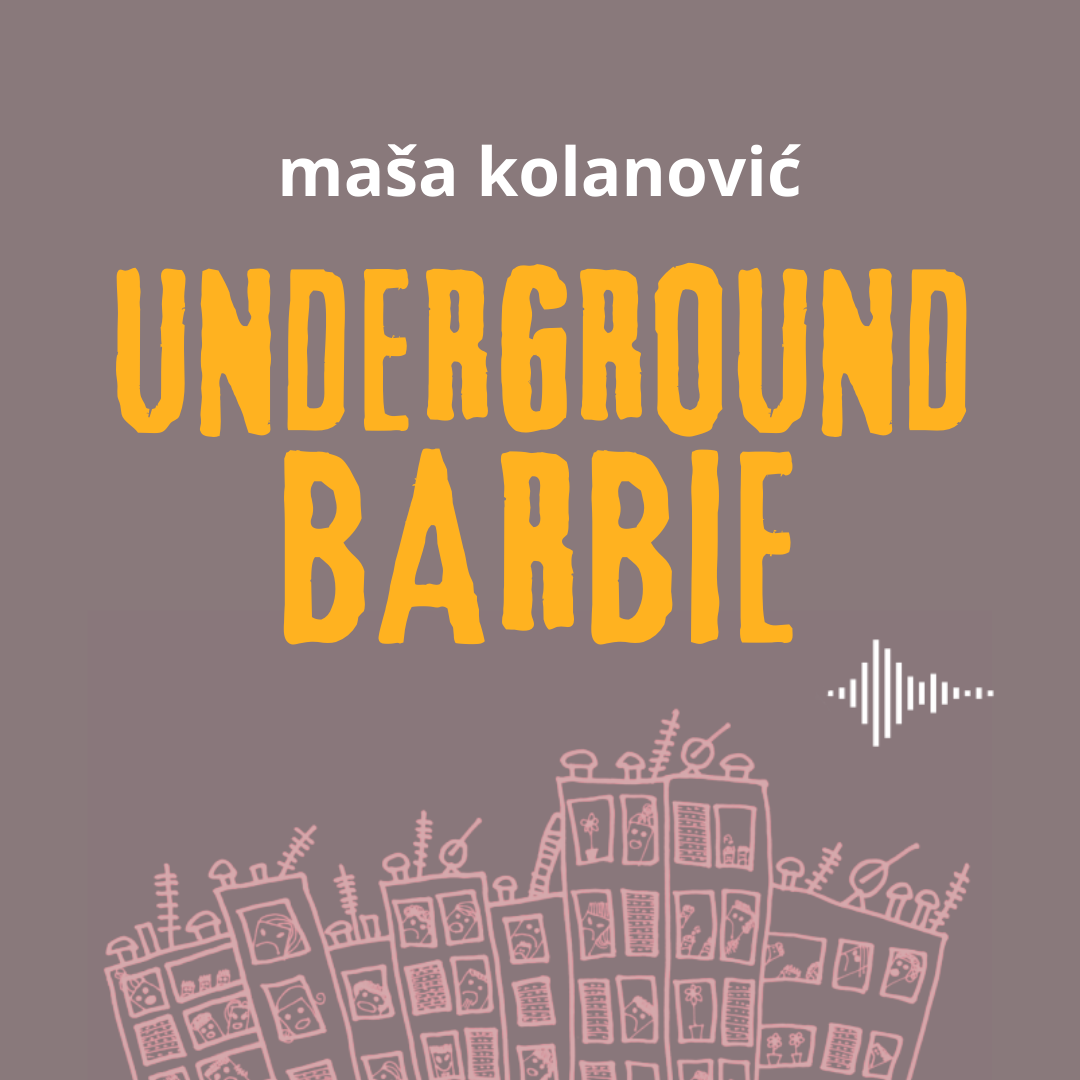As it is often said in fairy tales and historical analyses, Maša's childhood years were a time when empires were falling—the time of the war in Croatia, 1991. Underground Barbie is set in that era, but also in the sounds of her childhood, the music, and the atmosphere that accompanied Barbie's move from plastic, yet safe, dollhouses to air-raid shelters. Her Barbie was interpreted and narrated by Tatiana Tajči Cameron, known to the Croatian public primarily for her wildly successful music career that burst out while representing Yugoslavia during the Eurosong competition. Today, she continues her music career in the USA. Through the narration of the famous Croatian singer, and original music by Ivana Đula and Luka Vrbanić, we are transported to the last childhood of Yugoslavia and the first childhood of Croatia (M. Jergović). This is a story about the Barbie generation, which still remembers Yugoslavia and socialism but truly grew up and formed its views and interests in the 1990s. It is also the last generation that seriously played with dolls. Later, electric toys prevailed, the family as the fundamental unit of society and children’s play disintegrated, and dolls became as unconvincing as fairy tales had a few decades earlier.
Those who will listen to this audiobook through the "Barbie lens" should be forewarned that this is not light reading, although it is easy on the ears and relatable. It is as heavy as Hans Christian Andersen's The Steadfast Tin Soldier. It is not "women's literature," although you would be hard-pressed to find something more feminine, and although gender and sex are as important in this book as they are in children’s games—meaning they couldn’t possibly be more important. This is not literature meant to relax or liberate you, or to do for you what the best-sellers on bookstore shelves do. Underground Barbie is terrifying, funny, and dark, just like childhood. It is the last childhood in Yugoslavia and the first in Croatia (based on the Afterword by Miljenko Jergović).
Maša Kolanović is a Croatian writer, born in 1979 in Zagreb. As Jagna Pogačnik writes, "She belongs to the generation that grew up in difficult times when 'everything was changing into something else,' a generation that was young enough to reduce all ties to past ideologies to a few Pioneer symbols, but old enough to understand that after the first air raid sirens and trips to the basements of the New Zagreb neighborhood, nothing would ever be the same again. Not even Barbie, that dark object of desire for so many generations of girls for whom it wasn't 'just' a toy." Kolanović has published several scholarly works (for which she won the Ministry of Science, Education, and Sports' Young Scientist Award in 2010 in the field of humanities) and literary works: the poetry collection Leeches for the Lonely (2001), the novel Sloboština Barbie (2008), Jamerika Trip (2013), and the short story collection Dear Insects and Other Creepy Stories (2019), for which she won the Vladimir Nazor Award, the European Union Prize for Literature, and the Libar za vajk award at the Pula Book Fair, and was a finalist for the Fric Award. Today, she works as an associate professor in the Department of Croatian Studies at the Faculty of Humanities and Social Sciences in Zagreb.
From sensationalist magazines, this is a book about the Barbie generation, which still remembers Yugoslavia and socialism but truly grew up and formed its views and interests in the 1990s. It is also the last generation that played with dolls seriously. Later, electric toys took over, the family as the fundamental unit of society and children's play fell apart, and dolls became as unconvincing as fairy tales had become a few decades earlier. [...] Underground Barbie is terrifying, funny, and dark, just like childhood. It is the last childhood in Yugoslavia and the first in Croatia. — Miljenko Jergović, from the Afterword
This seemingly "small" and marginal "story at the end of childhood" (M. Jergović), enriched with extraordinary drawings by the author herself, is one of the most delightful refreshers on the "regional" literary scene in many years, a first-class debut of an author who combines high literary competence with the natural quirkiness of a born Writer, with a talent that is bound to explode many more times! — Teofil Pančić, Vreme
[...] Underground Barbie is excellent prose (interwoven with the author’s equally effective drawings, which are not just illustrations but an essential part of the "narrative" process!) about the growing up of girls whose games with the mythical Barbie doll, once played in peaceful children's rooms and the streets of New Zagreb, were suddenly relocated to shelters because of the war. But the story doesn't stop at children's games; from an infantile perspective, seemingly naive and innocent but actually sharp and witty, it reflects on a time when "war games" were Croatia's everyday reality. — Mirjana Jurišić, Večernji list
Cover illustration: Maša Kolanović
First published in the Croatian language as Sloboština Barbie by Maša Kolanović
© VBZ, Zagreb 2008
English translation © Ellen Elias-Bursać
By kind permission of Sandorf Passage
The publication of Underground Barbie audiobook is co-funded by the Ministry of Culture and Media of the Republic of Croatia.

